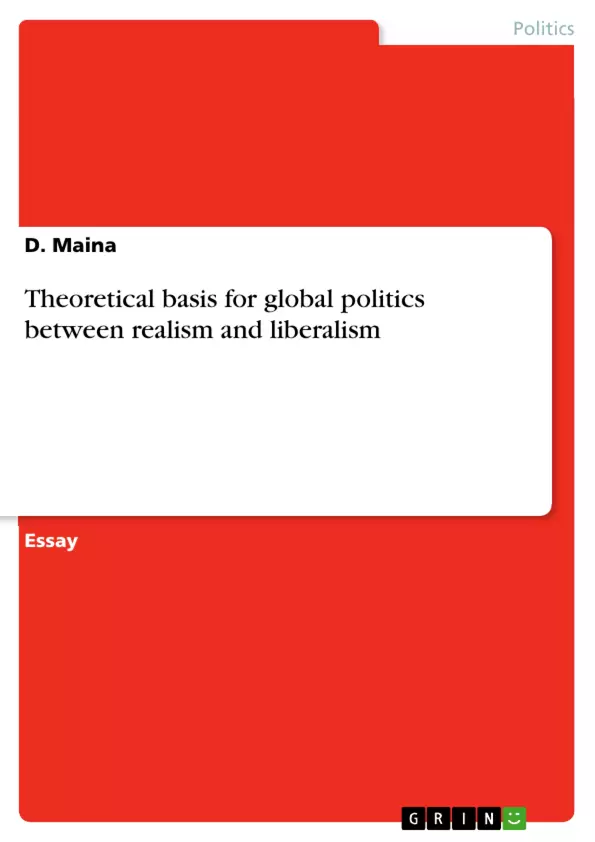This essay evaluates the two schools of thought to determine which one best explains the state of global politics. It is argued that realism is a more practical representation of the world politics than liberalism as evidenced by global power struggles, wars, isolationism, and ineffective international organizations.
International relations or global politics is characterized by different schools of thought, including realism and liberalism. Basically, realist thought in global politics emphasizes the view that nation-states should pursue unitary political objectives such as power and influence to protect national interest. To realists, the world is a harsh place and application of moral standards limits leaders to do what is logically in the interest of the nation. As such, non-state actors are viewed as antagonistic to the wellbeing of the nation and should be given a wide berth. Contrastingly, liberalism advocates for international cooperation in the interest of collective benefits. Liberalists oppose the use of military power, which they claim is an outdated realist thought.
Table of Contents
- Introduction
- Global Domination
- Isolationism
- Prevalence of War
- Bias and Ineffectiveness of International Organizations
- Pressure of Globalization
Objectives and Key Themes
This essay aims to evaluate realism and liberalism as competing schools of thought in global politics, ultimately arguing that realism better explains the current state of international relations. The essay examines various aspects of international politics, from power struggles and trade relations to the role of international organizations, and highlights the prevalence of realist principles in shaping these dynamics.
- The pursuit of power and influence by nation-states
- The prevalence of isolationist tendencies and trade conflicts
- The role of military power and the recurrence of war in international relations
- The limitations and biases of international organizations
- The impact of globalization on traditional realist and liberalist approaches to global politics
Chapter Summaries
- Introduction: This introductory chapter lays the groundwork for the essay, presenting realism and liberalism as contrasting perspectives on global politics. It emphasizes the emphasis on power and national interest in realist thought and contrasts it with liberalist advocacy for international cooperation.
- Global Domination: This chapter argues that realism is evident in the pursuit of global domination by nation-states. It uses the Sino-American relations as a case study to highlight how power struggles drive foreign policies and the use of military power to protect national interests.
- Isolationism: This chapter examines how realist thought influences trade and economic interests. It highlights isolationist tendencies in trade agreements, emphasizing the pursuit of self-interest by nations over international cooperation. Examples of US trade policies and Brexit are used to illustrate this point.
- Prevalence of War: This chapter argues that the prevalence of war across history reinforces the validity of realist principles in global politics. It challenges the liberalist view of international cooperation and focuses on how conflicts often arise from the pursuit of national interests, with examples from the Middle East serving as illustrations.
- Bias and Ineffectiveness of International Organizations: This chapter questions the effectiveness of international organizations in promoting collective good, arguing that their influence is often undermined by the powerful nations who prioritize their own interests. It uses examples like the US-China trade disputes and China's reluctance to adhere to WTO guidelines to illustrate this point.
Keywords
This essay explores key concepts such as realism, liberalism, global politics, international relations, power, influence, national interest, international cooperation, isolationism, trade agreements, military power, war, international organizations, globalization, and state-centric approaches. It investigates how these concepts play out in various aspects of global politics, revealing the underlying principles that govern interactions between nation-states.
- Quote paper
- D. Maina (Author), 2023, Theoretical basis for global politics between realism and liberalism, Munich, GRIN Verlag, https://www.hausarbeiten.de/document/1405565


